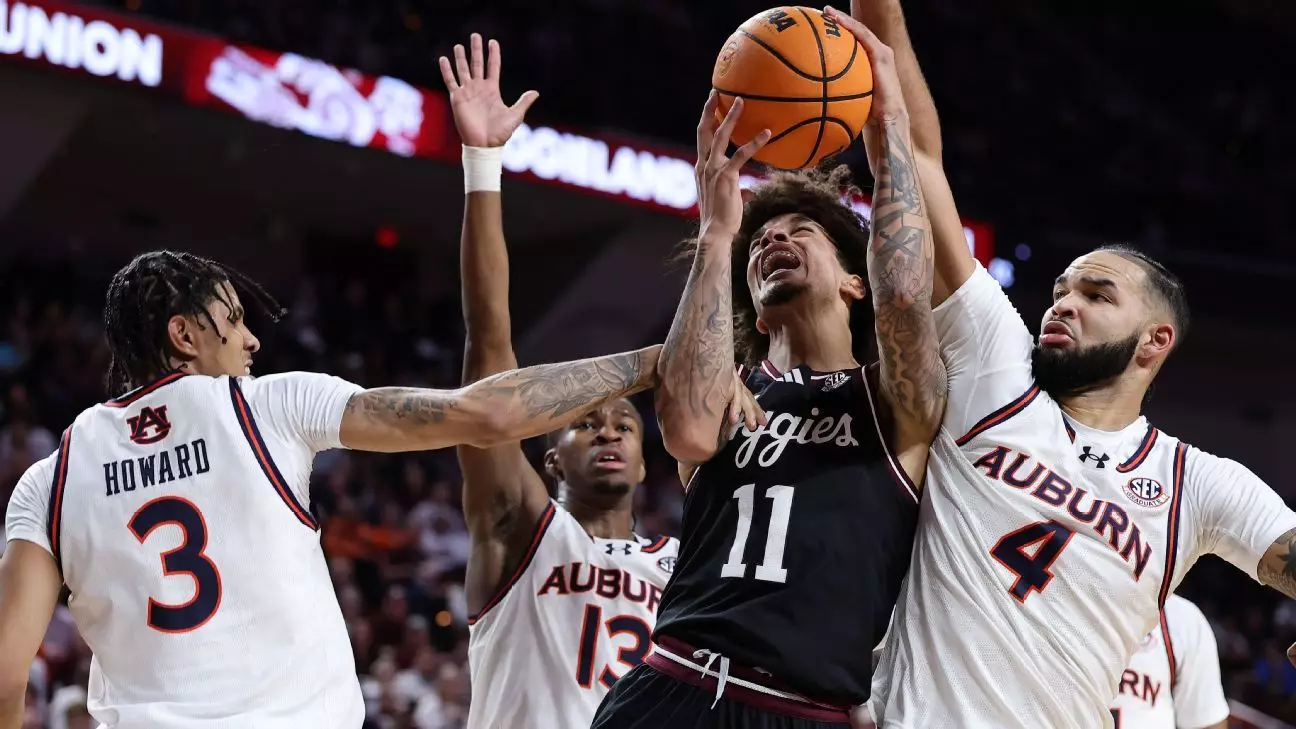In the landscape of college basketball, the significance of physicality often lurks in the shadows, overshadowed by flashier statistics and highlight reels. However, the recent clash between Auburn and Texas A&M starkly illustrated that brute strength can occasionally dictate the flow of a game far more than skill or strategy. Auburn coach Bruce Pearl’s admission that his team was “physically dominated” paints a disturbing picture of a once-dominant squad that faltered under pressure. The Aggies’ impressive 24-9 advantage in offensive rebounds doesn’t just tell a tale of grit; it reveals a mental and emotional failure on the part of the Tigers, who simply weren’t ready for a team that blended willpower with skill.
This wasn’t just a game; it was a clear demonstration of how mental fortitude often matches, if not exceeds, talent in sports. A competitive psyche allows a team to transcend its physical limits, and for Texas A&M, this game marked a turning point. Historically frail in high-pressure games, the Aggies rose to the occasion, pouring their heart and soul into every rebound, every screen, and every contested shot. Auburn’s inability to match that energy suggests a troubling vulnerability.
Are Auburn’s Prior Achievements a Double-Edged Sword?
Auburn’s impressive season, marked by a six-game winning streak and a recently acquired Southeastern Conference title, can be a double-edged sword. While such accomplishments undoubtedly instill confidence, they may also lead to complacency. It begs the question: After clinching their title, did the Tigers take the game against Texas A&M lightly? Coach Pearl denied any notion that the team overlooked their opponents but, in sports psychology, there is an ever-present risk of teams lowering their guard following significant successes.
With a unanimous No. 1 ranking hanging heavily on their backs, it’s tempting to view Auburn as invincible. However, as the Aggies showed, every team is susceptible to defeat, especially when they stop putting in the necessary work. The danger lies in becoming too comfortable; the top ranking can morph into an albatross, hindering performance rather than inspiring it.
The Impact of Injuries: Unseen Forces at Play
Injuries often act like unseen forces that ripple through a team’s dynamics. For Auburn, the absence of defender Denver Jones due to an ankle injury was more impactful than anyone could have anticipated. With a defensive stalwart sidelined, the Tigers weren’t just missing a player—they were missing an ethos. Jones’s capability to handle one-on-one coverage means other players were forced into roles that stretched them thin.
On the flip side, Texas A&M’s ability to capitalize on their physical advantages makes their triumph even more impressive. The missed opportunities for Auburn highlight just how crucial depth and adaptability are in college basketball. When key players are sidelined, another unit has to step up and complete the puzzle. Auburn lacked that depth, and it showed glaringly against a team that was hungry for victory.
Coaches as Architects of Success and Failure
The contrasting styles of the two coaches underscore how critical leadership is in high-pressure scenarios. Bruce Pearl has garnered considerable respect for his ability to lead teams to success, yet his candid acknowledgment of Auburn’s failures exemplifies a crucial lesson in accountability. In sports, success often breeds authority. However, real leadership surfaces when coaches push their teams beyond comfort zones and instill a commitment to unyielding physicality and strategic mindfulness.
On the other side, Buzz Williams has fostered an ethos of resilience that resonated with his players. His emphasis on communication and physicality speaks to a modern understanding of what makes teams successful. His philosophical approach could well be the difference between merely winning and establishing a culture of tenacity that can endure beyond individual seasons.
The Road Ahead: Learning from Failure
For Auburn, this unexpected defeat serves as a critical juncture. The road ahead may be fraught with challenges, but growth often emerges from moments of adversity. Coaches and players alike must confront the sobering realities of failures like these if they intend to reclaim their hard-earned standing in the rankings. Going forward, embracing a rigorous mentality—not only physically but also emotionally and mentally—will be crucial for the Tigers.
This game against Texas A&M is not merely a blip on their record; it is a transformative moment. As they reflect on this experience, a deep analysis must occur, one that digs beyond the surface to confront entrenched habits that may have led them astray. In the cutthroat world of college basketball, the only constant is change; for Auburn, the lessons learned in this defeat could be the catalyst for a remarkable resurgence.


Leave a Reply